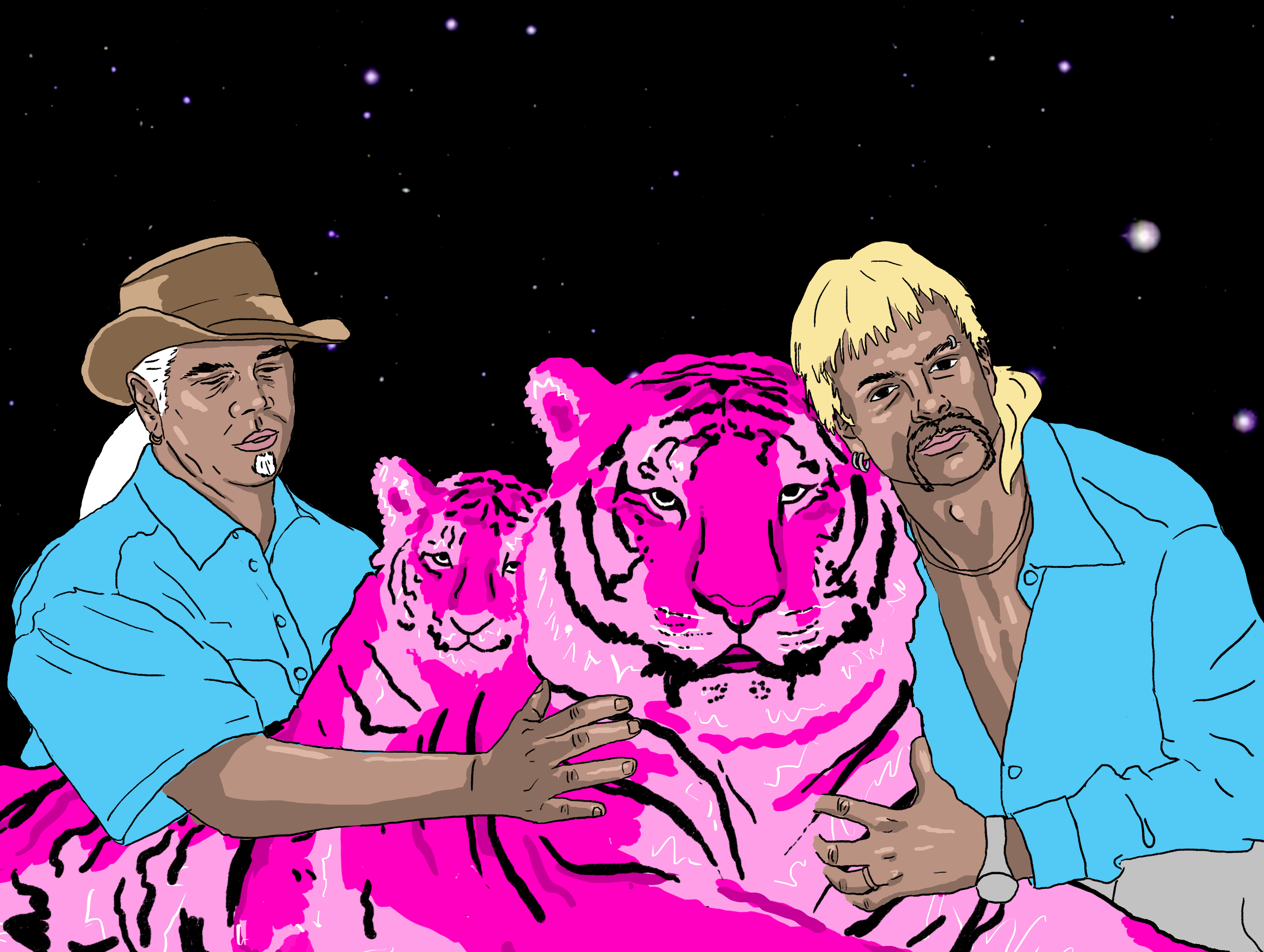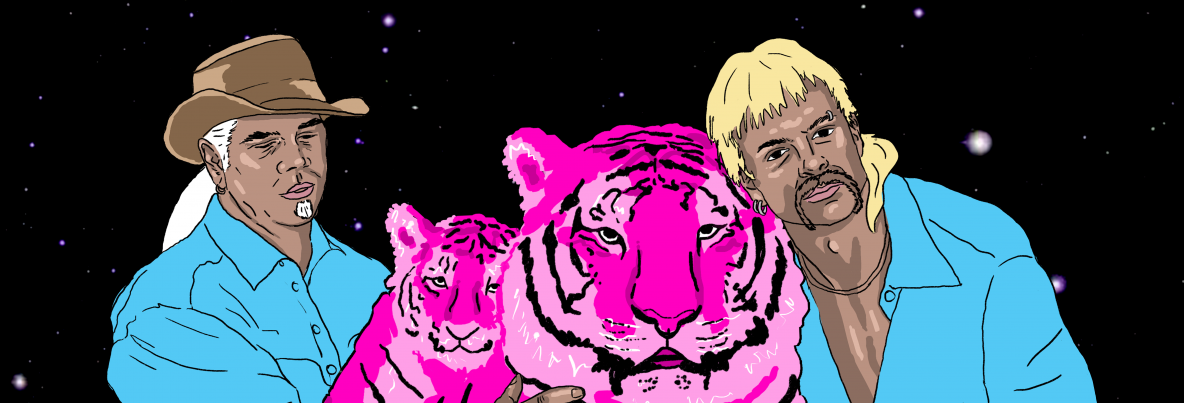THE MORAL CORRUPTION OF netflix's TIGER KING
5 things wrong with the current most popular show on television
By Milla Alexander / 28 April 2020

Illustration by Jade Pughe
So what is Tiger King: Murder, Mayhem and Madness about?
Tiger King centres around “Joe Exotic”: big cat collector, owner of G.W. Zoo, and wannabe celebrity. You’re introduced to the money-making potential of these big cats, and you also meet other prolific big cat owners known to, and by, Joe. You learn of the antagonistic relationship Joe has with his nemesis Carole Baskin - ‘animal rights activist’ and founder of Big Cat Rescue. An entire episode revolves around Joe accusing Carole of murdering her husband, who went missing in 1997. Later, Joe is indicted and prosecuted for a murder for hire plot, after paying someone to kill Carole Baskin. Joe Exotic refutes these claims but is currently serving a 22-year prison sentence.
Oh yeah, and a fraction of the documentary is dedicated to exploring the exotic animal business and highlighting the obsession many Americans have with owning them.
The provocative storyline, controversial characters, and downright salacious drama are what captivated audiences around the world. In fact, it had 34 million viewers within 10 days of release. Despite the current global pandemic, obsession for this docu-series is spreading fast.
By now, if you haven’t watched Tiger King you may want to, just to engage in the memes and hashtags with more understanding. If you have watched it, perhaps you’re feeling guilty that you got caught up, or you’re still unsure of what the big bad deal is.
So, here are five things wrong with Tiger King:
1. Doc Antle
It’s difficult to decide who the biggest baddie is when it comes to comparing the owners of the zoos, but ‘Doc Antle’ definitely deserves a mention. During scenes of him riding his elephant through streets and into rivers, Antle talks about the many teenagers who had joined his apprentice programme over the decades. He goes on to speak about his many “wives and girlfriends” who were there “taking care of his stuff”. It’s safe to say his “stuff” included more than cleaning cages and putting on tiger shows.
Barbara Fisher spoke of the terrible living conditions, minimal pay ($100 per week), and manipulation:
“If they wanted to get to the top, they would have to sleep with him. I didn’t want to, but I was thinking about it. There was a certain personality of woman that he wanted - they were virgins, or close to virgins”
“He chose our outfits. We had to be sexy because we’re luring people in. He controlled every aspect of our day, what we’re allowed to do, what we could eat as vegetarians. But also they were pushing me to get implants. The appointments were made. They had decided, and I was too scared to say I didn’t want to do it”.
The series portrayed the ill-treatment and lack of respect for women as normal and even comedic; as if it ‘came with the territory'.
2. Human Rights Violations
It was clear that everyone who worked for the zoos was complicit in the goings-on. But what was also obvious was the way Joe Exotic lured in vulnerable people who would then become indebted to his ‘kindness’. Joe exotic paid his staff £190 per week for six days of twelve-hour shifts, provided rat-infested living quarters, and treated them like they were nothing.
His romantic relationships were allegedly fuelled by drugs, guns, cars and big cats and, an assumption, that they were too vulnerable to stray. There are many mentions of meth and marijuana and, after accidentally shooting himself dead - it’s clear that Travis was in a vulnerable position indeed.
3. Endangered species
5000-10,000 tigers are living in captivity in the US and fewer than 4000 remain in the wild. Estimates put the global captive tiger population as high as 25,000.
How many tigers there are in US back yards can only be estimated because a majority of captive tigers are crossbred (remember the ‘ligers’?) so rather than being identified as one of the six tiger subspecies, they’re classified as ‘generic’. There is also no legal requirement to register tigers for tracking and monitoring.
There are no federal laws prohibiting or regulating private possession of big cats in the United States. It’s also legal to own big cats for commercial purposes, assuming they’ve obtained a license and adhere to the Animal Welfare Act; an act that sets bare minimum care standards for animals at roadside zoos.
The statistic above appears at the end of the series. But nobody talks about why, and no one points out the idiocy of claims like Tim Allen’s: “if tigers are endangered, breeding them is a good thing”.
4. Animal Abuse
The “pay to play” seen frequently throughout the series is an inherently cruel business. Exhibitors “speed breed” female cats multiple times a year, which impacts her health and often leads to her producing sick cubs that fail to thrive. They also cross-breed unnatural hybrids, which leads to defects and chronic health issues.
Cubs are then taken from their mothers instantly (Joe even admits to feeding cubs straight out the womb) to be hand-raised. They are often fed a nutritionally deficient diet to stunt their growth, so they can be used for “cub petting” longer. It was no secret that G.W. Zoo collected expired meat from supermarkets to feed to the animals. After, of course, the staff were given first dibs.
In order to prevent the cubs from “acting up” (behaving like a normal cub), they’re subjected to long hours of rough handling, sleep deprivation and physical abuse such as being punched and violently shaken. The stress cubs undergo - being separated from their mothers, handled by multiple people a day and the abusive handling - leaves them vulnerable to disease, including some that are transmissible to humans.
By as little as eight weeks, cubs are usually too large to interact with humans, and at this point, they're discarded. If they’re not then used for breeding they’ll likely be shipped off to substandard facilities or killed. There are many instances throughout the documentary when people speak of the cost of feeding the animals and the fact that once they’re not producing revenue, they’re seen as a burden. Though it’s insisted that animals are only euthanised when they’re sick, it’s hard to believe these merciless, money-hungry predators wouldn’t kill what they view as a money-eating commodity.
Add to this the small, barren cages the animals are kept in - it’s clear they’re doomed for a miserable existence. What laws are in place are minimal and often violated. The care and conditions these cats are subjected to is criminal.
5. Unethical Filmmaking
As documentary making goes, this is one filmmakers will aspire to out-do; it’s clear that the directors knew they were on to something big when filming. Perhaps that’s why it took a turn from what was allegedly set to be “the Blackfish for big cats” to something that resembled reality TV.
There were many opportunities within the documentary to divert the conversation and bring focus to the issues of owning endangered and exotic animals. The moment Saffery loses their forearm after having a tiger bite into it, for example. Or the introduction of Carole Baskin and the feud she had with Joe Exotic. Or when a tiger pulls Joe to the ground by his foot, and he is surrounded by four big cats in an enclosure. Or. Or. Or.
But no. Instead, what the viewer is directed to fixate on is that Joe Exotic marries two, much younger straight men. The audience become distracted by is the lifestyles people like ‘Doc Antle’ lead. Or the drug lord exotic animal owner. Or that Joe threatens the life of Carole Baskin on so many occasions it becomes trite.
So consumed are common folk and celebrities with Tiger King that comedian Joel McHale “insisted on hosting a glitzy follow-up special”. The episode is to catch up with seven of the characters including producer Rick Kirkham, Jeff Lowe and John Reinke.
McHale asks how people have found documentary afterlife and questions whether some of the staff of G.W. Zoo regret being involved with Joe Exotic (not on the line up). Erik Cowie speaks of helping the euthanise tigers and shares that this would be done whether the cat was sick or not and then alleges that the animals had it ‘better’ than the staff (unlikely). It’s clear from all the interviews that none of them has respect for Joe and that they’re happy to see the back of him.
When asked if he’s seen ‘the nanny’ Cowie replies “I’ve seen her booty and that’s about it”...
“The nanny” McHale is referring to is Jeff Lowe's actual nanny. When speaking to Lowe and his wife, McHale asks “How’s the nanny working out?” to which his wife replies “she’s hot”. A picture of her pops up. This is an example of what the documentary series was really all about.
The only person who really talks honestly about the issues with the documentary is Rick Kirkham. He admits that three months into living at the zoo he began to see Joe exotic do things to animals that were wrong: “As I’ve admitted, I sold out my journalistic integrity by not just going to the authorities…” He says he regrets ever meeting Joe Exotic and that he got sucked into the surreal world of the “crazy zookeeper”. A regret that, it’s clear, came too little too late.
Why should ‘Tiger King’ be seen as unethical film making? You know, other than the fact that the many abhorrent behaviours and practices are washed over and used as filler for the obscenely far-fetched story of the characters lives.
When Jeff Lowe and co work with the feds to help bring Joe Exotic down, it occurs that at some stage, during the five years of filming. You’d hope that someone from the production would have recognised that the cruelty that the big cats and other exotic animals were experiencing was not worth the acclaim.
If you haven’t already watched Tiger King, do you really want to? If you already have, what’s your opinion of it now?
Art by
Words by
Share this article

